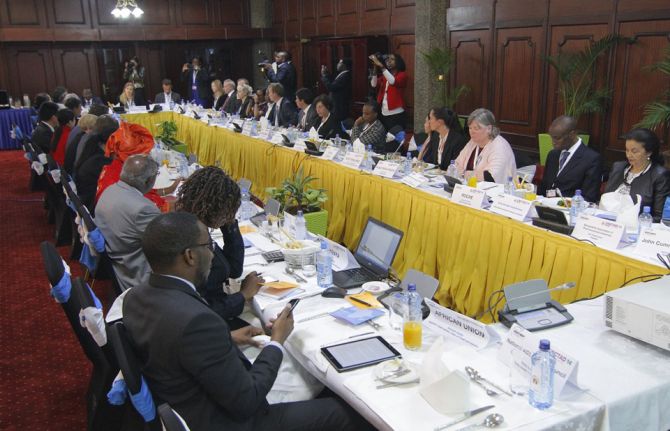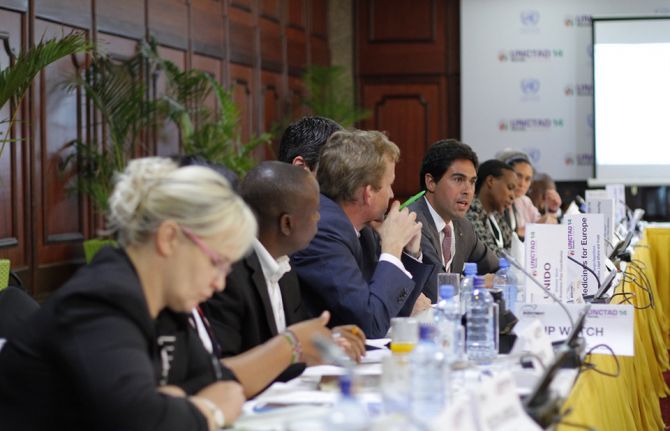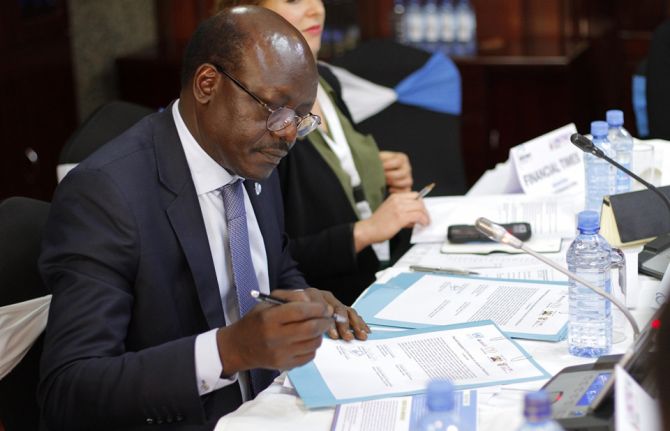



Update
Opportunities to expand local production of pharmaceutical products in Africa
25 July 2016
25 July 2016 25 July 2016Leaders of private sector organizations, investors, civil society and United Nations representatives met in Nairobi, Kenya, during the World Investment Forum 2016 to discuss business opportunities for expanding local production of pharmaceutical products in Africa and beyond. The event was part of efforts to support the Sustainable Development Goals (SDGs) and particularly to improve access to testing and treatment for HIV, TB and other health conditions.
UNAIDS and UNCTAD with support from the German Federal Ministry for Economic Cooperation and Development (BMZ) held a roundtable discussion where participants highlighted the challenges facing African local pharmaceutical producers including how to meet requirements related to the quality, safety and efficacy of medicines and good manufacturing practices. The need for foreign investment and government support was underscored as essential to the promotion of local production of quality medicines and the transfer of technologies and know-how.
During the session the African Union Commissioner for Trade and Industry Fatima Haram Acyl, Kenyan Cabinet Secretary (Minister of Health) Cleopa Mailu, South African Trade and Industry Minister Rob Davies, UNCTAD Secretary-General Mukhisa Kituyi and UNAIDS Executive Director Michel Sidibé signed the Nairobi Statement on Investment in Access to Medicines which highlights the importance of African domestic policies on health, investment, trade, technology and intellectual property, as well as the integration of markets.
In a statement delivered at the meeting, Mr Sidibé underscored the importance of access to medicines and the need for domestic solutions on the African continent. Mr Kituyi noted that pharmaceutical investment was particularly sensitive due to its impact on public health and stressed the need for concerted effort and political will. According to Mr Mailu many national pharmaceutical markets in Africa are relatively small on their own and that, without international support and in the face of competition from low-priced generic products, local manufacturing would continue to struggle. Mrs Acyl highlighted the need to accelerate implementation of the Pharmaceutical Manufacturing Plan for Africa, which was adopted by the Heads of State and Government of the African Union.
UNCTAD Director of Investment and Enterprise, James Zhan, discussed the importance of policy coherence, building local manufacturing capacities through investment, and developing multilateral cooperation to strengthen the pharmaceutical sector. Mr Zhan stressed that investment facilitation could not be promoted in isolation from a country's overall development goals.
The event brought together senior figures in health, development, investment and pharmaceuticals, to explore practical issues around access to finance, challenges for local producers, what investors need and look for, and examples of successful operations. The event was attended by pharmaceutical manufacturers from Bangladesh, Germany, India, Thailand and West Africa and trade and investment representatives from Belgium, China, Germany, Kenya, Switzerland and Uganda.
Quotes
"To achieve the Sustainable Development Goals, including ending the AIDS epidemic as a public health threat by 2030, African countries need to secure sustained access to affordable, quality-assured medicines and other health commodities. This is a health and development priority."
“Local production is essential for improved access to affordable medical products, and therefore to ensure a strong linkage between local production and improved access, there is need to bring coherence between health, industrial development and trade policies in the pharmaceutical sector.”
“Dialogue between Ministers of Trade and Ministers of Health is critical to advance the local production agenda. South Africa has the largest market for pharmaceuticals on the continent, with a total value of US$ 4 billion, but it also faces the biggest challenges and has the largest programme for provision of antiretrovirals.”
“We need to produce our own generic medicines for our people. While substantive progress is being made in the health, trade, investment and intellectual property sectors individually, a significant degree of coherence across these sectors is essential for the continent to reap maximum benefits of a viable pharmaceutical sector.”



